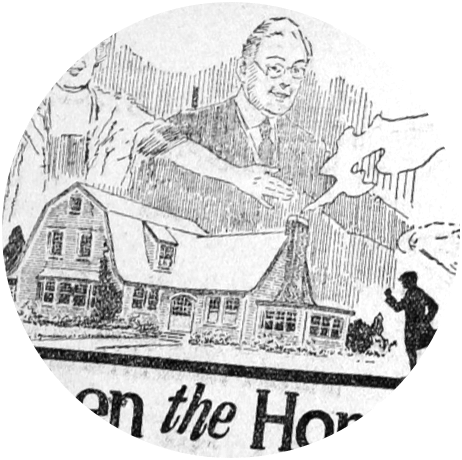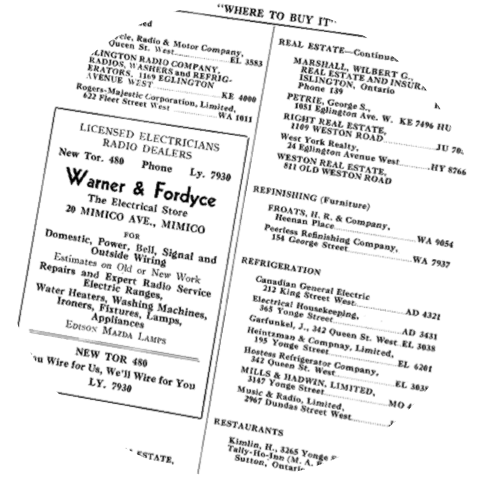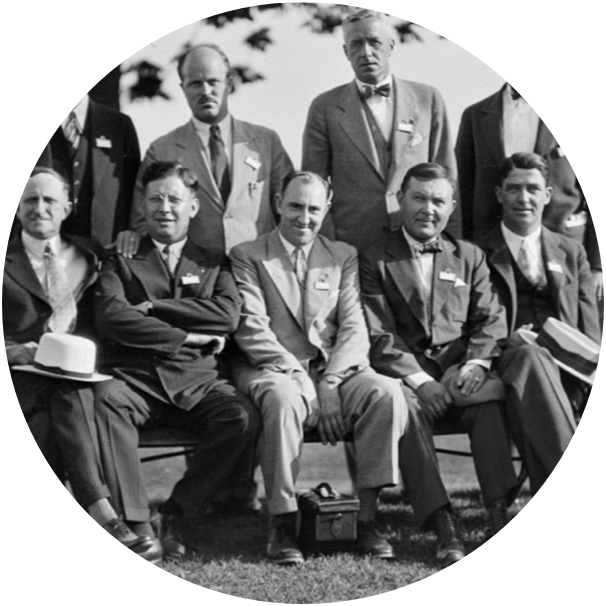“The growing demand for low-cost accommodations brought on by World War II, with the need to house munitions workers as well as returning veterans, led to the federal government’s first direct involvement in new house construction. Although the city and neighbouring municipalities were involved in the construction of emergency housing to cope with shortages, it was the federal government that became the major player on the local scene, constructing large tracts of housing in the townships around Toronto. In the postwar period, the federal government scaled down and finally withdrew from its housing programs, leaving the provision of housing to the private sector.” (“Your Home Our City: Wartime Housing,” City of Toronto)
Category: TRREBs Beginning: 1920–1945
The TRREB Beginnings:
1920–1945
Globe and Mail Headlines
The war effort spurred high levels of volunteerism throughout Toronto. When the need was high, so was the enthusiasm of the citizenry towards charity and public works. Though overall numbers are not available, Toronto-area REALTORS® certainly paid their dues on the front lines. Postwar biographies of new TRREB Members and Presidents often mentioned their military service. For example, Past President Joseph Abela served in the British army, and Douglas Brownridge was in the RCAF.
Buy Victory Bonds
“Canadians’ willingness to loan money to their own government by buying war bonds exceeded all expectations. No bond issue in Canadian history had raised more than $5 million, but Ottawa’s first ’victory bond’ drive brought in $100 million, twice the initial estimate. Subsequent drives proved just as successful. Publicity campaigns, including tens of thousands of posters, linked buying bonds to the direct support and welfare of soldiers overseas and used a variety of messages to encourage contributions, from well-known poems to emotional imagery.” (“Finance and War Production,” Canadian War Museum) These bonds helped thousands of people save towards their first home purchase.
Development of Ethical Code Article
At the turn of the 20th century, unethical and often criminal salespeople called “curbstoners” preyed on those unfamiliar with real estate purchasing. This unregulated time of speculation and property selling came to a close when TRREB was established and the Code of Ethics adopted. Even five years after its establishment, TRREB received kudos in the press for its professional approach to community building.
The Victory Garden
With World War II came shortages of all types, and the rise of the Victory Garden. Homeowners planted vegetables to offset meager wartime rations. In addition, the more produce grown by Canadians in front yards, vacant lots, apartment green spaces, and repurposed flower gardens, the more food could be shipped overseas to soldiers and allied countries. At TRREB, the Board held enlisted memberships for real estate practitioners at no cost for the duration of the conflict.
Homebuying Advertisement
An advertisement from a newspaper from April 25, 1923, encouraging spring homebuying.
County of York Directory
A photograph of the 1935–36 biyearly directory for the County of York (Ontario). It included towns, villages and rural districts in alphabetical order.
National Association of Real Estate Boards
In the early days, real estate conventions were North American affairs. In fact, the National Association of Real Estate Exchanges’ (later, NAREB; now NAR) first Code of Ethics was approved at the 1913 Annual Convention in Winnipeg. In 1930, an estimated 6,000 U.S. REALTORS® travelled to join their Toronto colleagues at the convention.
“Realtor” is New Word in Business Vocabulary
Use of the term REALTOR® has been protected since the very early days of real estate boards in North America. It was originally coined by Charles N. Chadbourn in 1916, to refer to real estate professionals who are Members of the US-based National Association of REALTORS®. Chadbourn famously stated that those who would be REALTORS® “would rather lose a record-breaking commission than violate his own conscience.” (NAR, 2013)
Toronto Real Estate News
“The provincial government took steps in the middle ‘30s to give the business a boost in respectability through the institution of the Real Estate Broker’s Act, which among many other things forced the broker to keep proper books of account and a trust account for his deposits. This has prevented recurrences of unscrupulous fellows (and in depression days there were a few of them) decamping on a spree with the clients deposit.” (C. C. Ruttle, May 1955, Listings)









